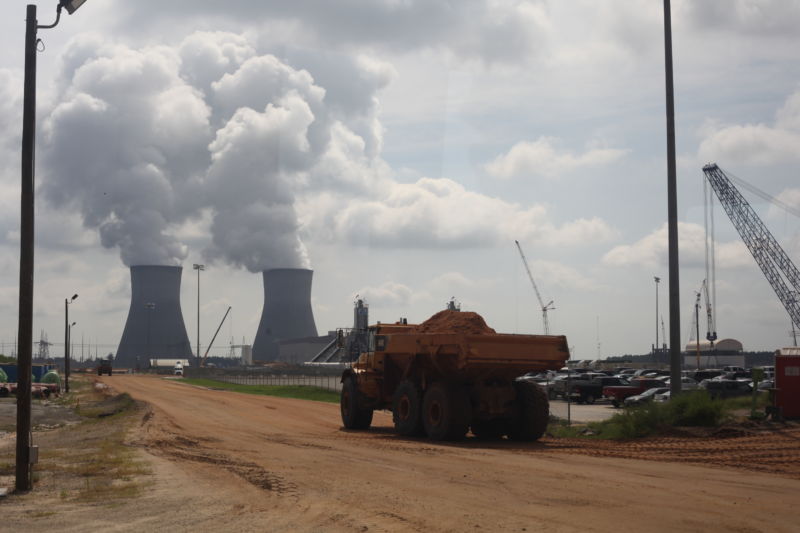
The Georgia Public Service Commission (PSC) wants to keep two under-construction reactors at the Vogtle nuclear plant alive. According to a proposal offered by Commissioner Tim Echols and unanimously supported by the rest of the PSC, the plant will allow majority-owner Georgia Power to place some of the financial burden of completing the project on rate payers (that is, utility customers).
Vogtle is the only nuclear plant currently under construction in the US, and it was the first new nuclear reactor construction to begin in three decades when it was commissioned in 2006. (Unit 2 of the Watts-Bar power plant came online in 2016, but it began construction in 1976. Construction of the the 80% complete reactor was put on hold in the 1980’s.)
With some incentives for completion included in the PSC’s proposal, the reactors are now anticipated to come online in 2021 and 2022.
The reactor build-out project faced cancellation this year after nuclear developer Westinghouse declared bankruptcy. Vogtle’s reactors have been delayed repeatedly (originally they were supposed to come online in 2016 and 2017) and are dramatically over budget.
Georgia Power said it would need an additional $8.9 billion to complete the project. But Toshiba, the parent company that owns Westinghouse, recently paid the owners of Vogtle a guarantee of $3.68 billion, so the Georgia PSC approved a cost request of just $7.3 billion. (Use your Toshiba money to finance the rest, was the PSC’s message.) Including financing costs, the total amount required to bring the project to completion is expected to be around $10.5 billion.
That will bring the total cost to build the two new Vogtle reactors to more than $25 billion. The new reactor construction was approved in 2006.
The Vogtle expansion, which will add a third and fourth reactor to two existing reactors, is about 40 percent complete, according to the Florida Times-Union. Its counterpart, the Summer nuclear expansion, also aimed to add two reactors to an existing two-reactor plant in South Carolina. But that expansion was only 35 percent complete when Westinghouse declared bankruptcy. Facing more than $11.5 billion in additional construction costs to finish, the project’s 45-percent owner, Santee Cooper, said it would walk away from the project. Summer is not expected to be completed.
Nukes vs. natural gas
The Georgia PSC’s vote to move Vogtle ahead interestingly appeared to hinge on predictions about the price of natural gas in the future. The owners of the plant expansion argued that construction should continue because the new reactors would become cost-effective if natural gas prices rose in the future. The PSC’s internal analysis suggested that natural gas prices would not rise, and thus the reactor expansion would not be economical. “Everyone agrees that both analyses depend heavily on the forecast of future natural gas prices, and we all agree we have no crystal ball on that,” wrote Commissioner Echols in his proposal. “I am not willing to trust anyone’s snapshot forecast today of future gas prices as a basis for abandoning the nearly $5 billion we have already invested in this 60 to 80-year asset.”
The go-ahead from Georgia’s PSC is not unconditional—it allows the PSC to reconsider its approval if certain nuclear tax credits are not approved. According to Utility Dive: “The tax bill Congress just passed does not extend the nuclear PTC, though Sen. Lisa Murkowski told Utility Dive they could included it in an extenders package next year.”
To ensure that these reactors stay on deadline, the PSC’s provision reduces the return on equity that Vogtle owners can collect every month after June 1, 2021 for reactor three and June 1, 2022 for reactor four.
The proposal also authorized an additional 5MW of community solar to be sited at Vogtle due to “the need to continue to develop other carbon free sources of generation.” Utilities and regulators have come to different conclusions about how best to develop carbon-free energy. In August, Duke Energy Florida decided to cancel plans to build a nuclear plant in western Florida and instead begin a 700MW expansion of solar capacity around the company’s service area.
Correction: This article originally said that upon completion, Vogtle would be the first nuclear capacity online in the US in three decades. However, the reactors are only the first to start construction in three decades. Watts-Bar began construction in the 70’s and came online in 2016.
https://arstechnica.com/?p=1236723

